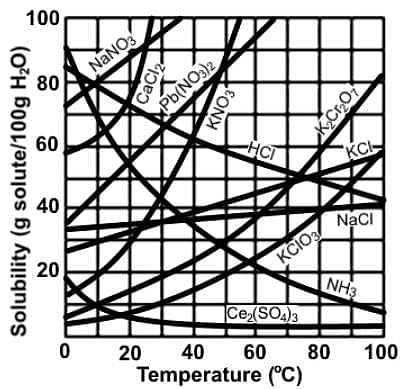MCAT Exam > MCAT Questions > Which of the following statements most accura...
Start Learning for Free
Which of the following statements most accurately describes the data in the following chart depicting solubility of various compounds in water at varying temperatures?

- a)The solubility of solids increases as temperature increases because the dissolution of solids is an exothermic process.
- b)The solubility of gases decreases as temperature increases because the dissolution of gas is an endothermic process.
- c)The solubility of HCl decreases due to the extensive hydrogen bonding that occurs between HCl molecules.
- d)The solubility of cesium sulfate decreases since the enthalpy of hydration releases more heat than is needed for the lattice dissociation energy.
Correct answer is option 'D'. Can you explain this answer?
| FREE This question is part of | Download PDF Attempt this Test |
Most Upvoted Answer
Which of the following statements most accurately describes the data i...
If we look at the chart, all the gases (HCl and NH3) decreases in solubility as the temperature increases. When gases dissolve in a liquid, it is an exothermic process due to the latent heat released when the gas is brought from the gaseous to liquid or aqueous phase.
As for HCl, there is no hydrogen bonding since only F, O, and N can H-bond. Additionally, gas molecules do not H-bond since the particles are far apart.
Most of the solids increases its solubility as the temperature increase because the dissolution of solids is an endothermic process. Heat would be on the reactant side, and by adding more reactant, the equilibrium shifts to the right.
When considering the dissolution of solids, there are 2 possibilities: endothermic and exothermic. When dissolution is exothermic, more will not dissolve when the temperature increases.
For cesium sulfate, the heat released when new bonds are formed between the ions and water molecules or the enthalpy of hydration is very exothermic. It exceeds the energy required to break the lattice, which is equal to the lattice energy.
The correct answer is that the solubility of cesium sulfate decreases since the enthalpy of hydration releases more heat than is needed for the lattice dissociation energy.
Free Test
FREE
| Start Free Test |
Community Answer
Which of the following statements most accurately describes the data i...
If we look at the chart, all the gases (HCl and NH3) decreases in solubility as the temperature increases. When gases dissolve in a liquid, it is an exothermic process due to the latent heat released when the gas is brought from the gaseous to liquid or aqueous phase.
As for HCl, there is no hydrogen bonding since only F, O, and N can H-bond. Additionally, gas molecules do not H-bond since the particles are far apart.
Most of the solids increases its solubility as the temperature increase because the dissolution of solids is an endothermic process. Heat would be on the reactant side, and by adding more reactant, the equilibrium shifts to the right.
When considering the dissolution of solids, there are 2 possibilities: endothermic and exothermic. When dissolution is exothermic, more will not dissolve when the temperature increases.
For cesium sulfate, the heat released when new bonds are formed between the ions and water molecules or the enthalpy of hydration is very exothermic. It exceeds the energy required to break the lattice, which is equal to the lattice energy.
The correct answer is that the solubility of cesium sulfate decreases since the enthalpy of hydration releases more heat than is needed for the lattice dissociation energy.
Attention MCAT Students!
To make sure you are not studying endlessly, EduRev has designed MCAT study material, with Structured Courses, Videos, & Test Series. Plus get personalized analysis, doubt solving and improvement plans to achieve a great score in MCAT.

|
Explore Courses for MCAT exam
|

|
Similar MCAT Doubts
Which of the following statements most accurately describes the data in the following chart depicting solubility of various compounds in water at varying temperatures?a)The solubility of solids increases as temperature increases because the dissolution of solids is an exothermic process.b)The solubility of gases decreases as temperature increases because the dissolution of gas is an endothermic process.c)The solubility of HCl decreases due to the extensive hydrogen bonding that occurs between HCl molecules.d)The solubility of cesium sulfate decreases since the enthalpy of hydration releases more heat than is needed for the lattice dissociation energy.Correct answer is option 'D'. Can you explain this answer?
Question Description
Which of the following statements most accurately describes the data in the following chart depicting solubility of various compounds in water at varying temperatures?a)The solubility of solids increases as temperature increases because the dissolution of solids is an exothermic process.b)The solubility of gases decreases as temperature increases because the dissolution of gas is an endothermic process.c)The solubility of HCl decreases due to the extensive hydrogen bonding that occurs between HCl molecules.d)The solubility of cesium sulfate decreases since the enthalpy of hydration releases more heat than is needed for the lattice dissociation energy.Correct answer is option 'D'. Can you explain this answer? for MCAT 2024 is part of MCAT preparation. The Question and answers have been prepared according to the MCAT exam syllabus. Information about Which of the following statements most accurately describes the data in the following chart depicting solubility of various compounds in water at varying temperatures?a)The solubility of solids increases as temperature increases because the dissolution of solids is an exothermic process.b)The solubility of gases decreases as temperature increases because the dissolution of gas is an endothermic process.c)The solubility of HCl decreases due to the extensive hydrogen bonding that occurs between HCl molecules.d)The solubility of cesium sulfate decreases since the enthalpy of hydration releases more heat than is needed for the lattice dissociation energy.Correct answer is option 'D'. Can you explain this answer? covers all topics & solutions for MCAT 2024 Exam. Find important definitions, questions, meanings, examples, exercises and tests below for Which of the following statements most accurately describes the data in the following chart depicting solubility of various compounds in water at varying temperatures?a)The solubility of solids increases as temperature increases because the dissolution of solids is an exothermic process.b)The solubility of gases decreases as temperature increases because the dissolution of gas is an endothermic process.c)The solubility of HCl decreases due to the extensive hydrogen bonding that occurs between HCl molecules.d)The solubility of cesium sulfate decreases since the enthalpy of hydration releases more heat than is needed for the lattice dissociation energy.Correct answer is option 'D'. Can you explain this answer?.
Which of the following statements most accurately describes the data in the following chart depicting solubility of various compounds in water at varying temperatures?a)The solubility of solids increases as temperature increases because the dissolution of solids is an exothermic process.b)The solubility of gases decreases as temperature increases because the dissolution of gas is an endothermic process.c)The solubility of HCl decreases due to the extensive hydrogen bonding that occurs between HCl molecules.d)The solubility of cesium sulfate decreases since the enthalpy of hydration releases more heat than is needed for the lattice dissociation energy.Correct answer is option 'D'. Can you explain this answer? for MCAT 2024 is part of MCAT preparation. The Question and answers have been prepared according to the MCAT exam syllabus. Information about Which of the following statements most accurately describes the data in the following chart depicting solubility of various compounds in water at varying temperatures?a)The solubility of solids increases as temperature increases because the dissolution of solids is an exothermic process.b)The solubility of gases decreases as temperature increases because the dissolution of gas is an endothermic process.c)The solubility of HCl decreases due to the extensive hydrogen bonding that occurs between HCl molecules.d)The solubility of cesium sulfate decreases since the enthalpy of hydration releases more heat than is needed for the lattice dissociation energy.Correct answer is option 'D'. Can you explain this answer? covers all topics & solutions for MCAT 2024 Exam. Find important definitions, questions, meanings, examples, exercises and tests below for Which of the following statements most accurately describes the data in the following chart depicting solubility of various compounds in water at varying temperatures?a)The solubility of solids increases as temperature increases because the dissolution of solids is an exothermic process.b)The solubility of gases decreases as temperature increases because the dissolution of gas is an endothermic process.c)The solubility of HCl decreases due to the extensive hydrogen bonding that occurs between HCl molecules.d)The solubility of cesium sulfate decreases since the enthalpy of hydration releases more heat than is needed for the lattice dissociation energy.Correct answer is option 'D'. Can you explain this answer?.
Solutions for Which of the following statements most accurately describes the data in the following chart depicting solubility of various compounds in water at varying temperatures?a)The solubility of solids increases as temperature increases because the dissolution of solids is an exothermic process.b)The solubility of gases decreases as temperature increases because the dissolution of gas is an endothermic process.c)The solubility of HCl decreases due to the extensive hydrogen bonding that occurs between HCl molecules.d)The solubility of cesium sulfate decreases since the enthalpy of hydration releases more heat than is needed for the lattice dissociation energy.Correct answer is option 'D'. Can you explain this answer? in English & in Hindi are available as part of our courses for MCAT.
Download more important topics, notes, lectures and mock test series for MCAT Exam by signing up for free.
Here you can find the meaning of Which of the following statements most accurately describes the data in the following chart depicting solubility of various compounds in water at varying temperatures?a)The solubility of solids increases as temperature increases because the dissolution of solids is an exothermic process.b)The solubility of gases decreases as temperature increases because the dissolution of gas is an endothermic process.c)The solubility of HCl decreases due to the extensive hydrogen bonding that occurs between HCl molecules.d)The solubility of cesium sulfate decreases since the enthalpy of hydration releases more heat than is needed for the lattice dissociation energy.Correct answer is option 'D'. Can you explain this answer? defined & explained in the simplest way possible. Besides giving the explanation of
Which of the following statements most accurately describes the data in the following chart depicting solubility of various compounds in water at varying temperatures?a)The solubility of solids increases as temperature increases because the dissolution of solids is an exothermic process.b)The solubility of gases decreases as temperature increases because the dissolution of gas is an endothermic process.c)The solubility of HCl decreases due to the extensive hydrogen bonding that occurs between HCl molecules.d)The solubility of cesium sulfate decreases since the enthalpy of hydration releases more heat than is needed for the lattice dissociation energy.Correct answer is option 'D'. Can you explain this answer?, a detailed solution for Which of the following statements most accurately describes the data in the following chart depicting solubility of various compounds in water at varying temperatures?a)The solubility of solids increases as temperature increases because the dissolution of solids is an exothermic process.b)The solubility of gases decreases as temperature increases because the dissolution of gas is an endothermic process.c)The solubility of HCl decreases due to the extensive hydrogen bonding that occurs between HCl molecules.d)The solubility of cesium sulfate decreases since the enthalpy of hydration releases more heat than is needed for the lattice dissociation energy.Correct answer is option 'D'. Can you explain this answer? has been provided alongside types of Which of the following statements most accurately describes the data in the following chart depicting solubility of various compounds in water at varying temperatures?a)The solubility of solids increases as temperature increases because the dissolution of solids is an exothermic process.b)The solubility of gases decreases as temperature increases because the dissolution of gas is an endothermic process.c)The solubility of HCl decreases due to the extensive hydrogen bonding that occurs between HCl molecules.d)The solubility of cesium sulfate decreases since the enthalpy of hydration releases more heat than is needed for the lattice dissociation energy.Correct answer is option 'D'. Can you explain this answer? theory, EduRev gives you an
ample number of questions to practice Which of the following statements most accurately describes the data in the following chart depicting solubility of various compounds in water at varying temperatures?a)The solubility of solids increases as temperature increases because the dissolution of solids is an exothermic process.b)The solubility of gases decreases as temperature increases because the dissolution of gas is an endothermic process.c)The solubility of HCl decreases due to the extensive hydrogen bonding that occurs between HCl molecules.d)The solubility of cesium sulfate decreases since the enthalpy of hydration releases more heat than is needed for the lattice dissociation energy.Correct answer is option 'D'. Can you explain this answer? tests, examples and also practice MCAT tests.

|
Explore Courses for MCAT exam
|

|
Signup for Free!
Signup to see your scores go up within 7 days! Learn & Practice with 1000+ FREE Notes, Videos & Tests.
























